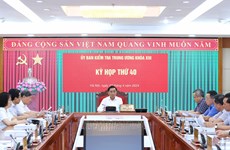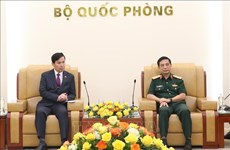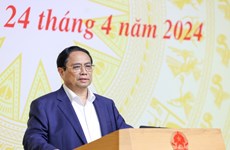Newly-elected Party chief hosts press conference
The 11th National Congress of the Communist Party of Vietnam (CPV) has
blown a new breath and new hope, and created a high consensus and
democratic atmosphere in the entire Party and people.
The 11th National Congress of the Communist Party of Vietnam (CPV) has
blown a new breath and new hope, and created a high consensus and
democratic atmosphere in the entire Party and people.
Newly-elected General Secretary of the 11th CPV Central Committee Nguyen Phu Trong made these comments at a press conference held in Hanoi on Jan. 19, following the closing ceremony of the 11th National Congress of the CPV.
Amidst the nation’s important events and interests from international friends as well as officials, Party members and people across the country, the 11 th National Party Congress accomplished the agenda on schedule and in line with the regulations, and reaped a wide range of good results, Trong said.
The fundamental contents of the Congress and major documents, such as the Platform for National Construction during the transitional period towards socialism (supplemented and developed in 2011), the Socio-economic Development Strategy for the 2011-20 period, the Political Report and the Party Statute, were discussed and adopted, demonstrating the frankness and democracy at the Congress, he added.
Regarding the 11th CPV Central Committee’s membership, an important matter that drew public attention right from the preparations to the end of the Congress, the Party chief said the 11th National Party Congress saw the largest ratio of candidates to elected members.
The personnel plans for the 11th CPV Central Committee were conducted democratically and objectively, he said, adding that the Party encouraged the self-nomination and recommendation of candidates.
He highly valued the attention from Vietnamese people both in and outside the country and international friends, stressing that the Congress had received more than 170 messages and letters of congratulations – the largest-ever number – from various international political parties, organisations and friends.
Trong attributed the success of the Congress to the careful preparations, the competent organisation of Party Congresses at all levels, the political firmness and knowledge of the Congress’s delegates, and the care, support and opinions contributed by the entire Party and people.
The Party leader also spoke highly of the great and effective efforts of reporters and press agencies in providing timely information about the event, thereby contributing to the success of the Congress.
Asked about the questioning process in the Party after the Congress, Trong said the move is one of the ways to ensure democracy. Since the 10 th National Party Congress, the CPV Central Committee has agreed that the questioning should be made at its meetings.
However, he noted, there have been few questionings, and it is essential to expand this process within the Party in the future to comply with the common development trend.
On the prioritised fields for the years to come, Trong said, pursuing the Congress’s theme of c ontinuing to enhance the Party’s leadership capacity and combativeness, the General Secretary, the CPV Central Committee and the entire Party must focus on building the Party and upholding the strength of great national unity.
“One of the most important lessons the Communist Party of Vietnam has drawn up since its inception is to build great national unity, considering it a strategic issue,” he stressed.
The Party chief also promised to comprehensively step up the renewal process, not only in the economy but also in other fields, to renew the political system’s leadership method and foster the nation’s international integration.
Trong said an important task for the next five years is to create a foundation for Vietnam to basically become a modern-oriented industrialised country by 2020. Vietnam would strive to become a socialist-oriented modern industrialised nation by the middle of the 21 st century, he added.
At the press conference, General Secretary Trong, Permanent Deputy Foreign Minister Pham Binh Minh, and Deputy Chief of the Office of the CPV Central Committee Nguyen Van Thao answered many local and foreign reporters’ queries about the country’s major policies and decisions to cope with economic challenges, improve the economy’s efficiency and competitiveness, ensure human rights and combat corruption./.
Newly-elected General Secretary of the 11th CPV Central Committee Nguyen Phu Trong made these comments at a press conference held in Hanoi on Jan. 19, following the closing ceremony of the 11th National Congress of the CPV.
Amidst the nation’s important events and interests from international friends as well as officials, Party members and people across the country, the 11 th National Party Congress accomplished the agenda on schedule and in line with the regulations, and reaped a wide range of good results, Trong said.
The fundamental contents of the Congress and major documents, such as the Platform for National Construction during the transitional period towards socialism (supplemented and developed in 2011), the Socio-economic Development Strategy for the 2011-20 period, the Political Report and the Party Statute, were discussed and adopted, demonstrating the frankness and democracy at the Congress, he added.
Regarding the 11th CPV Central Committee’s membership, an important matter that drew public attention right from the preparations to the end of the Congress, the Party chief said the 11th National Party Congress saw the largest ratio of candidates to elected members.
The personnel plans for the 11th CPV Central Committee were conducted democratically and objectively, he said, adding that the Party encouraged the self-nomination and recommendation of candidates.
He highly valued the attention from Vietnamese people both in and outside the country and international friends, stressing that the Congress had received more than 170 messages and letters of congratulations – the largest-ever number – from various international political parties, organisations and friends.
Trong attributed the success of the Congress to the careful preparations, the competent organisation of Party Congresses at all levels, the political firmness and knowledge of the Congress’s delegates, and the care, support and opinions contributed by the entire Party and people.
The Party leader also spoke highly of the great and effective efforts of reporters and press agencies in providing timely information about the event, thereby contributing to the success of the Congress.
Asked about the questioning process in the Party after the Congress, Trong said the move is one of the ways to ensure democracy. Since the 10 th National Party Congress, the CPV Central Committee has agreed that the questioning should be made at its meetings.
However, he noted, there have been few questionings, and it is essential to expand this process within the Party in the future to comply with the common development trend.
On the prioritised fields for the years to come, Trong said, pursuing the Congress’s theme of c ontinuing to enhance the Party’s leadership capacity and combativeness, the General Secretary, the CPV Central Committee and the entire Party must focus on building the Party and upholding the strength of great national unity.
“One of the most important lessons the Communist Party of Vietnam has drawn up since its inception is to build great national unity, considering it a strategic issue,” he stressed.
The Party chief also promised to comprehensively step up the renewal process, not only in the economy but also in other fields, to renew the political system’s leadership method and foster the nation’s international integration.
Trong said an important task for the next five years is to create a foundation for Vietnam to basically become a modern-oriented industrialised country by 2020. Vietnam would strive to become a socialist-oriented modern industrialised nation by the middle of the 21 st century, he added.
At the press conference, General Secretary Trong, Permanent Deputy Foreign Minister Pham Binh Minh, and Deputy Chief of the Office of the CPV Central Committee Nguyen Van Thao answered many local and foreign reporters’ queries about the country’s major policies and decisions to cope with economic challenges, improve the economy’s efficiency and competitiveness, ensure human rights and combat corruption./.












